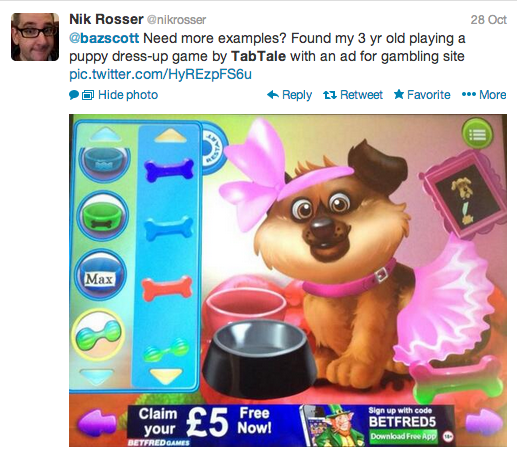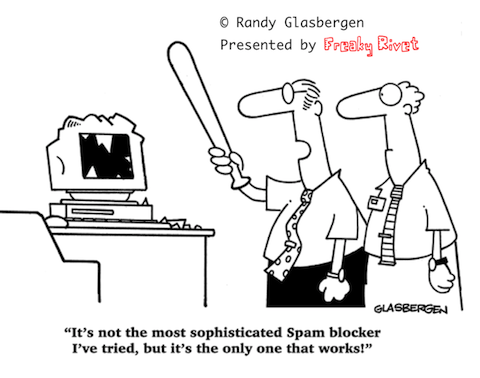The mighty advertising industry has been steadily moving its multiple billions of dollars online. This is mainly because online, instead of advertising everything at everyone, you can advertise things more directly to the people who would be interested in them. In principle, that’s not a bad thing.
But I start to get uncomfortable where that principle turns into nearly 3.5 billion ads for food alone being targeted at children online. You can bet that not much of that was advocating the benefits of broccoli.
That trend only looks like increasing right now. Why? Three main reasons. First, because advertising works. Second, because we’re all increasingly online. And third and most insidious, because we want the internet for free.
Think of it in the (supposedly) adult world. Facebook is “free”. Yet, at the end of 2012, they had about 5,000 employees. Those aren’t people putting in 50 hour weeks out of an altruistic need to give us a free social network. They have their own and their families’ mouths to feed, which means they need paying.
How do they get paid? Well, we pay Facebook with personal data. Advertisers then pay them cash in order to get their Ads in front of us based on what’s in that data. That in turn allows Facebook to give us a service which we’re not paying for in cash.
It’s pretty black and white. If you don’t like Facebook using your data, then get off it. They can’t fund your online social life for you without some form of payment. At Freaky Rivet, for example, one of our founders is comfortable paying Facebook with data about himself, and the other isn’t. So guess what? One of us has an active account and shares stuff with friends, and gets heavily advertised at. The other doesn’t have an active account, and doesn’t get the ads. We’re both happy with our decision – but we did each make one.
Things get a lot more sensitive when it’s kids involved.
First, because the industry is very good at not being so obvious when it’s advertising. That’s not just the kids – there’s an entire product placement industry that feeds men of a certain age with Aston Martin desires through Bond films. Pretty much every romantic film runs adverts for the diamond industry. With kids, as with adults, it’s not just obvious banner ads, but also in-game branding, or more contentiously, in-app direct purchases.
Second, because the advertisers very often don’t have control over where their adverts appear. There are platforms (such as Google AdSense or Facebook Ads) which try to match adverts to people online. Sadly, that doesn’t always go right, and with kids, the results can be pretty ugly.
Recently, British American Tobacco’s Vype e-cigarettes made an appearance in a children’s iPad game.
British American Tobacco advertise cigarettes to kids via iPad games for kids with Apple iAD’s pic.twitter.com/aVstTSrFPM
— Graham Brown-Martin (@GrahamBM) October 25, 2013
Gambling company Betfred had an advert that made its way into a puppy dress-up game.

This time last year, payday lender Wonga had its adverts making their way into an app teaching kids to get ready for bed.
Wonga adverts found on Talking Ginger children’s games http://t.co/8SOYbafa
— Guardian Money (@guardianmoney) October 10, 2012
Although I have no time for tobacco, gambling or payday loan companies, I’m not sure that what happened in this instance was their fault. It could just as easily have been somewhere between their advertising provider and the advertising platform. If it was the platform, they have no control over it. And not knowing really worries me, as it makes it difficult to pinpoint where the issue is and deal with offenders, and stop it (intentionally or accidentally) slipping through the cracks.
Third, there are also many occasions where what is being advertised to them is intentionally just plain not good for them. Opinions here will vary a lot, but I’m not wild about my kids being asked to collect Haribos by an online game. And this is where the disturbing finding of 3.4 billion food ads targeted at children in 2012 is particularly worrying, especially with obesity rates on the rise.
In the UK, television has historically used two models to fund the things we watch. The BBC model, although a little muddier now, in general has people paying an annual fee to get shows without (explicit) advertising. The independent TV model lets you watch programmes for ‘free’, but in return, we get advertising during and between the programmes, which is paid for by the advertisers. It’s not so different.
So we want to know what you think. It is actually a very pertinent issue for us here at Freaky Rivet. We are about to go live with our online club to get kids moving, creating and exploring. Kids will be able to post up their own activities, and get rewarded for creating and doing activities. The goal is to motivate them to do more – whether that’s physical, creative, exploratory, outdoors, or whatever. Our preference is not to use advertising to children to fund this. But that means we would need to charge a subscription for using the platform. As a parent, what do you think? If your child were to join a club like this, would you rather pay a small subscription fee or keep it free by having adverts?
P.S. If you’re looking for tips on how to prepare your kids for dealing with online advertising, here’s an interesting article by Webroot Internet Security.
P.P.S. If you want to laugh, read this story about not banning internet advertising and how it relates to the Easter bunny from Chris Moerdyk. This article has some spicy language, and is not for children.
